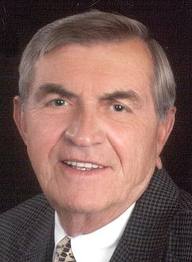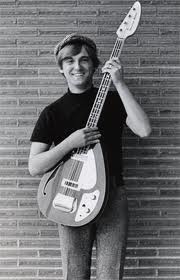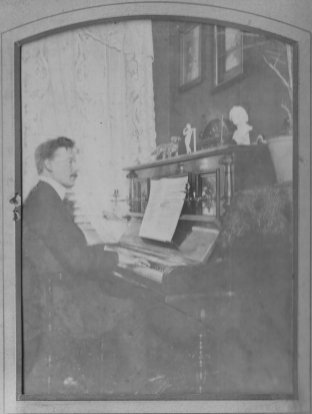Prominent
William Cornelius Vandenberg Sr. (1884-1971)

Michigan state senator (1944-1950) and lieutenant governor (1950-1952) from Genemuiden-branch
William C. Vandenberg, Sr. was born in Holland, Michigan, on October 3, 1884, and with the exception of the period from 1904 to 1919, lived in Holland his entire life. After graduating from Holland High School in 1904, he entered Voorhees' Business College in Indianapolis and began his active business career in Grand Rapids in 1906.
Mr. Vandenberg began working in 1909 in the office of the former Grand Rapids Street Railway Company and later was assigned to the office of Benjamin S. Hanchett, president and general manager. Hanchett was active in Republican politics and it was here that Vandenberg became interested in Republican affairs. Hanchett later became president of the old Grand Rapids, Holland and Chicago Railroad and headed both the Ottawa Beach Hotel Co. and the Ottawa Beach Resort Co. Vandenberg became treasurer of the interurban operation and secretary and treasurer of the hotel and resort companies. In 1919, Vandenberg left Grand Rapids to enter the wholesale and retail oil business in Holland and during the next few years expanded the operations to cover five counties in Western Michigan. In 1934, he helped promote the Burnips oil field and later promoted and developed the Fillmore oil field.
Vandenberg served as a Holland city councilman in the 1930s, was elected in 1944 as a Republican state senator from the 23rd district and was reelected in 1946 and 1948. During his six years as a state senator, Vandenberg remained very active in local projects and was active in the early studies of a bridge over the Straits of Mackinac. In 1950, he was elected lieutenant governor, serving under Democratic Governor G. Mennen "Soapy" Williams (http://en.wikipedia.org/wiki/G._Mennen_Williams). In 1952, he was unsuccessful in a bid for the Republican gubernatorial nomination.
At the time of his death, Vandenberg served as vice president of Vandenberg Motors, where he had been since establishing the business in 1946. He died at Holland Hospital on June 9, 1971.
Stan Bareman (1938-2011)

Stanley Bareman was the second son of Mart and Martha Bareman and the grandson of Egbert Bareman and Elizabeth Vandenberg. Egbert and his family had a dairy farm with a processing operation in Holland Township, Michigan. They produced milk, cream and butter and delivered these products to the village residents. Stan was involved in his family's dairy business from the time of his earliest memories. He was to become the principle owner of Bareman's Dairy Inc. as the third generation came of age.
When Stan returned from the army in 1959, Bareman's had two home delivery vans delivering about 150 cases of milk per day. In the military Stan had been stationed in the western part of Oklahoma and Texas and it was here that he saw milk being sold at gas stations. Stan brought this idea home and applied it to their business. In doing so in 1960 Stan was a pioneer of the niche market that would become convenience store sale of milk. In 1976 the business had grown to the point that they needed their own processing plant. Stan's two route dairy has become the largest independently owned dairy in Michigan. Today Bareman's Dairy http://www.baremandairy.com/ employs over 300 people and distributes its products throughout both peninsulas of Michigan, northern Ohio, Indiana and the Chicago area. In these regions Bareman's not only serves convenience stores, but supermarkets and food service establishments as well.
Stan Bareman died unexpectedly on july 20, 2011, at Holland Hospital.
Ray Hummel III (1946)

Ray Hummel III is a 5th generation descendant of Jan Hummel and Trijntje Vandenberg.
Ray Hummel is the former lead singer of the JuJus, a Grand Rapids group from the mid 60's. The group had a hit with "You Treated Me Bad"/"Hey Little Girl" on the Fenton label that went as high as Number 2 on the local charts. Ray also plays guitar and banjo and toured with Chubby Checker. His solo projects never got much exposure. Ray says about that time when he started traveling the circuit, he was not home enough to promote it. It never went as far as it could have because of lack of hype and promotion. Ray says: As I started traveling west and north and south, I saw there was a big call for country music, for contemporary music, for show tunes - there was a call for a lot of things. Because I was playing so many types of clubs, I had to be versatile, and that's what I strived to do during those years on the road. In the beginning, I played everything from Frank Sinatra to the Beatles, Gerry and the Pacemakers, and Simon and Garfunkel; then I began to get into country.
You can read the whole story (and listen to "You treated me bad") on http://garagepunkinc.blogspot.com/
Edward Ralph Wolfert (1901-1979)

Edward Ralph Wolfert was the son of Jacob Wolfert and Elisabeth Vandenberg. In his youth his father owned and operated a meat market in Holland, Michigan. His father envisioned that some day his son would take over, but Edward had engineering on his mind. In high school as a member of the second team basketball, he vowed to be the best academically.
Edward was glad that he was born in "the greatest technological period in history" and became a scientist. His specialty fields were feeder voltage regulation, gyrodynamics, refrigeration, air conditioning, serve mechanisms, thermoelectrics and food preservation controlled atmosphere. In 1940 he was on a list by the National Association of Manufacturers of the 500 outstanding inventors and research scientists in the United States. In 1948 he even worked with Wernher von Braun on nuclear energy.
During World War II Wolfert was in charge of all the engineering phases of war work at the Westinghouse East Springfield plant and developed many gyro stabilizer devices such as tank gun stabilizers and radar antenna stabilizers. His work in the field is recognized in the book "Battle Fronts in Industry". Also during the war 30 million insect sprays cans ("bug bombs") were made from a joint venture with two others.
After the war the family never had to buy any appliance. Wolfert worked on air conditioners, refrigerators, vacuum cleaners, water coolers, food mixers, home freezers, dish washers, irons, toasters, coffee makers and microwave ovens. They were always the first to try themselves. Edward Wolfert has 38 patents on his name. Wolfert: "These were nearly all obtained before being in a supervisory capacity. I believed in stimulating creative thinking in others rather than getting patents in my name." http://www.google.com/patents/US2186224
After his retirement in 1965 Edward Wolfert and his wife sponsered the "Wolfert Conferences". Their purpose was to inform young people about the church-related vocations available to them. The conferences were coordinated by Western Theological Seminary and have been held in Michigan, Iowa, Illinois, California, Minnesota, South Dakota and Wisconsin. http://cms.hope.edu/resources/arc/collections/registers/wts/bennink.html
Wolfert suffered from diabetes from an early age on, but lived to be 78, a grateful man: "I've been lucky all my life. I was born of God-fearing parents. And I never had a bad boss."
Gerardus Dik (1881-1954)

Gerardus Dik was born in Groningen in 1881, grandson of Roelofje van den Berg, son of Jan Dik and Anna Kloek. His father worked hard to make a good living for his family, making some extra money in trade, and his mother was a broad minded, sophisticated lady, who encouraged her children to learn and develop, and to be creative in painting and music. Gerardus was talented in music. In the late 1890s he moved to Germany to improve his skills even more. He lived in Eisenach, Saxony, at that time. Gerardus was an adventurous man and liked to tell about his adventures. His niece Karoline remembers him telling that he traveled through Russia and that he came in a public bath house where men and women were strictly separated, so they would not see each other in the nude. Gerardus remarked "but those men up there, go into the womens department." "Yes" the man from the bath house replied, "but they are all personnel. Then, it does not matter." Gerardus thought there was a lot of personnel there.
In the early 1900s Gerardus played in the famous opera orchestra of Dresden.
http://en.wikipedia.org/wiki/Semperoper
In those years, the Semperoper premiered many of the works of Richard Strauss, like Salome (1905), Elektra (1909) and Der Rosenkavalier (1911). In that year Gerardus invited his sister Agatha to come and see him play. Agatha told Karoline many times that the days of that journey were the most marvellous of her entire life. She went to Dresden by train and Gerardus picked her up at the station. Gerardus played the "piston" (a copper horn) in the orchestra and it was a huge production with "even horses appearing on stage". These were the days before World War One and the atmosphere in Germany was one of progress. Because of World War I Gerardus and his wife left Germany to return to the Netherlands. Gerardus became the conductor of the military chapel, first of Den Bosch and then of Leiden. Those chapels attained a high level and appealed to the public with sunday afternoon concerts in parks and zoos. Later he conducted a Leiden choir (Werkmans Wilskracht) and taught violin and piano lessons. He died in 1954, had no children, but left us some pieces of music, like his adaptation for cornet of 'Old Kentucky Home' (1942)
Edward Sturing (1963)
Edward Sturing is a 5th generation-descendant of Pieter Buisman and Elizabeth van den Berg.
Since january 2012 he lives in Turkey, where he is assistent coach of Gençlerbirliği SK - a team that has been playing in the Süper Lig, the highest soccer league of Turkey, ever since 1989.
Sturing grew up in Apeldoorn and got a chance with Deventer Go Ahead Eagles talented youth team. He moved to dutch first divison side De Graafschap were he made his debut in 1982. Since 1983 he was always included in the squad and would play 136 games before he earned a transfer to Vitesse Arnhem. At Vitesse Arnhem offensive right back Edward Sturing became an icon. He promoted with Vitesse to dutch Eredivisie in 1989 and in that same year was elected for the Dutch national team. Edward Sturing would obtain 3 caps, making his debut against Brazil (0-1 loss) on dec. 20, 1989. The other caps were against Italy (0-0) and the Soviet Union (1-2). But Sturing was not elected for the World Championship in Italy of 1990, a championship in which the dutch team was quickly eliminated probably because of all the quarrels within the team that year.
Sturing the following years was very succesful at Vitesse, qualifying for european football in 1990, 1991, 1992, 1993, 1994 and 1997. Vitesse had their best years in 1990-1995, four times finishing 3rd in the dutch Eredivisie. Edward Sturing had a big role in the success, playing 229 Eredivisie games for them before retiring in 1998. After that Sturing was assistent coach at Vitesse until 2002 and coach from 2002 until 2004. From 2006 until 2008 Sturing was Head of the youth plan of PSV Eindhoven, where he gained an award for best youth plan of the Netherlands. Then he became coach of Volendam in 2009 and 2010. Edward Sturing in his career only scored 3 Eredivisie goals, but is still one of the most prominent players Vitesse ever had.



 website maken
website maken